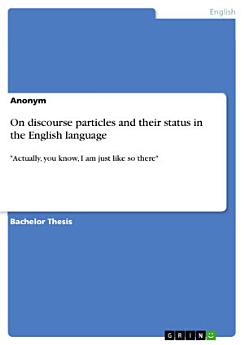On discourse particles and their status in the English language: "Actually, you know, I am just like so there"
Anonym
Sep 2017 · GRIN Verlag
Ebook
45
Pages
family_home
Eligible
info
reportRatings and reviews aren’t verified Learn More
About this ebook
Bachelor Thesis from the year 2017 in the subject English Language and Literature Studies - Linguistics, grade: 2,7, University of Göttingen, language: English, abstract: The present paper compares the representations of “discourse particles” in the German and English language. In the first part of this study Zimmermann ́s definition of the German “discourse particles” is outlined and complemented with results from studies by Thurmair (1989), Bublitz (1978), Waltereit (2001) and others that also worked on German discourse particles and put in contrast to concepts of words carrying discourse function in the English language. The study thereby focuses on the prototypical group of words that assume discourse function in the two languages, German modal particles and English discourse markers and illustrates its findings with two of their most prototypical representatives, German wohl and English actually. Both groups are compared in terminology, categorisation and in their morphological, semantic, pragmatic, and syntactic features. Switching from synchronic to diachronic perspective, the study also traces their historical development and it is shown, how these functions developed. In course of this study, it is briefly referred to less prototypical ways of expressing discourse function and it is detected, that there are German particles, that seem to resemble English discourse markers and vice versa. Furthermore, it is touched upon the semantic‐pragmatic dispute on how to detect their meaning and it is referred to their role out of a sociolinguistic perspective. Comparing the German and the English concept of “discourse particles”, the study is interested in prototypical behaviour and therefore chooses the most common approaches and terminology. Later on in the study, in chapter 2.3.3, it also takes into account less common uses.
Rate this ebook
Tell us what you think.
Reading information
Smartphones and tablets
Install the Google Play Books app for Android and iPad/iPhone. It syncs automatically with your account and allows you to read online or offline wherever you are.
Laptops and computers
You can listen to audiobooks purchased on Google Play using your computer's web browser.
eReaders and other devices
To read on e-ink devices like Kobo eReaders, you'll need to download a file and transfer it to your device. Follow the detailed Help Center instructions to transfer the files to supported eReaders.






